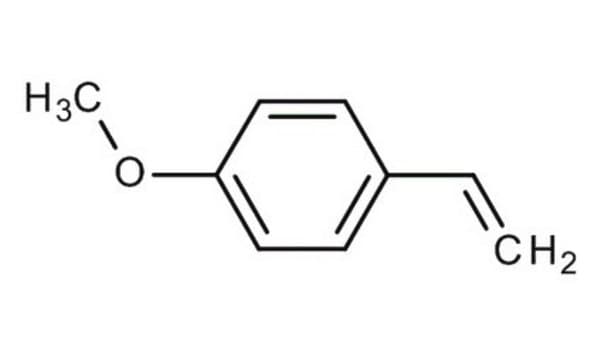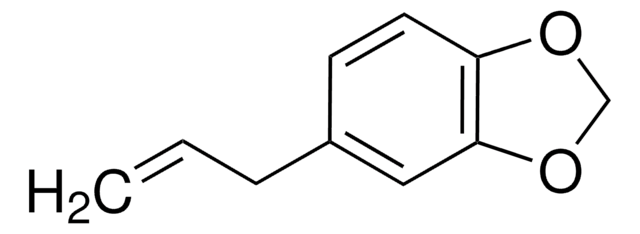D136905
1,2-Dimethoxy-4-propenylbenzene
99%
Synonym(s):
Isoeugenyl methyl ether
Sign Into View Organizational & Contract Pricing
All Photos(1)
About This Item
Linear Formula:
CH3CH=CHC6H3(OCH3)2
CAS Number:
Molecular Weight:
178.23
EC Number:
MDL number:
UNSPSC Code:
12352100
PubChem Substance ID:
NACRES:
NA.22
Recommended Products
description
mixture of isomers
Quality Level
Assay
99%
form
liquid
refractive index
n20/D 1.568 (lit.)
bp
262-264 °C (lit.)
mp
98-100 °C (lit.)
density
1.05 g/mL at 25 °C (lit.)
SMILES string
COc1ccc(\C=C\C)cc1OC
InChI
1S/C11H14O2/c1-4-5-9-6-7-10(12-2)11(8-9)13-3/h4-8H,1-3H3/b5-4+
InChI key
NNWHUJCUHAELCL-SNAWJCMRSA-N
Looking for similar products? Visit Product Comparison Guide
Related Categories
Storage Class Code
10 - Combustible liquids
WGK
WGK 2
Flash Point(F)
235.4 °F - closed cup
Flash Point(C)
113 °C - closed cup
Choose from one of the most recent versions:
Already Own This Product?
Find documentation for the products that you have recently purchased in the Document Library.
Customers Also Viewed
R Purchase et al.
Food and chemical toxicology : an international journal published for the British Industrial Biological Research Association, 30(6), 475-481 (1992-06-01)
Methyl isoeugenol was administered in rodent diet for a minimum of 28 consecutive days to groups of 16 male and 16 female rats (Sprague-Dawley strain) at levels of approximately 30, 100 and 300 mg/kg body weight/day. A further group of
Alexander T Cartus et al.
Drug metabolism and disposition: the biological fate of chemicals, 39(9), 1727-1733 (2011-06-03)
Methylisoeugenol (1,2-dimethoxy-4-propenylbenzene, 1) is a minor constituent of essential oils, naturally occurring as a mixture of cis/trans isomers. 1 is a U.S. Food and Drug Administration-approved food additive and has been given "Generally Recognized as Safe" status. Previously, metabolism of
A call for full ingredient labelling and uniform nomenclature on medicaments.
A E Pink et al.
The British journal of dermatology, 161(2), 489-490 (2009-06-24)
Todd J Barkman
Molecular biology and evolution, 20(2), 168-172 (2003-02-25)
Isoeugenol-O-methyltransferase (IEMT) is an enzyme involved in the production of the floral volatile compounds methyl eugenol and methyl isoeugenol in Clarkia breweri (Onagraceae). IEMT likely evolved by gene duplication from caffeic acid-O-methyltransferase followed by amino acid divergence, leading to the
Factors influencing conjugation of phenolic compounds with the epsilon-amino group.
Y Takeuchi
The Journal of dermatology, 12(2), 153-160 (1985-04-01)
Our team of scientists has experience in all areas of research including Life Science, Material Science, Chemical Synthesis, Chromatography, Analytical and many others.
Contact Technical Service








